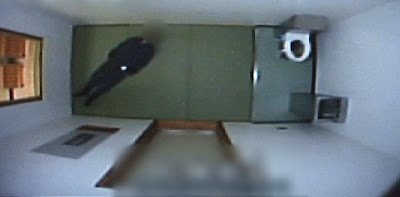 |
| Iwao taking a walk with his sister Hideko |
What would you be like if you'd spent the last half-century isolated in a tiny room, not knowing if you were going to make it to the end of the day alive? That is the question Kim Sungwoong asks in Freedom Moon, a new documentary about the Japanese former professional boxer
Iwao Hakamada, who was sentenced to death in 1968 for a mass murder. He was held on death row for nearly 46 years – a world record – before his
release in 2014.
In 1966, there was a fire at the home of one of Iwao's bosses. According to Iwao, he helped extinguish the fire, only to find the bodies of the executive, his wife and two children, all stabbed to death. Two months later, Iwao confessed to the crime and was arrested. But when the case reached court he immediately retracted his confession, claiming he had been forced into it after sustained periods of torture.
According to his lawyers, Iwao was interrogated for 264 hours over 23 days. Other evidence of Iwao's guilt was shaky: a small amount of gasoline and blood were allegedly found on pyjamas that Iwao was wearing that night. This evidence was later changed to "bloodstained clothes", but the clothes in question would not have fitted Iwao.
Various appeals for a retrial were denied, but once Norimichi Kumamoto – one of the judges who originally convicted Iwao – came out in support of his innocence, the fight gained momentum, and in 2014 he was finally granted a retrial. The presiding judge admitted "the possibility of [Iwao's] innocence has become clear to a respectable degree," and he was released from prison.
By this point, however, the damage to Iwao's life had already been done; he had been diagnosed with institutional psychosis several years prior to his release. This was arguably a result of Japan's inhumane method of detaining death row inmates in solitary confinement, in tiny cells, without any notice of their execution date.
On his release, Iwao was taken under the care of his sister, Hideko Hakamada, now 83, who had maintained that her brother was innocent since his arrest. It is this part of Iwao's life that director Kim Sungwoong documents in Freedom Moon.
Sungwoong spent one-and-a-half years with the siblings, following their progress as Hideko created a home for the two of them and Iwao was reintroduced to the outside world.
 |
| Osaka prison cell block where inmates are held in solitary confinement |
The first thing that hits you, on watching the film, is the severity of Iwao's condition. He paces around Hideko's small apartment, creating the same circle, time and time again, seemingly oblivious to other people. He appears to have lost sense of who he is, referring to himself at times as God, the head of all corporations, or an undefeated emperor.
"Because the case was so famous, at certain times – anniversaries, etc – mass media would come flying in, ask huge amounts of intrusive questions, then quickly leave," explains Sungwoong. These moments were perhaps the most uncomfortable parts of the film to watch; crowds of journalists and cameras packed into the tiny apartment with Iwao. Invariably, he was asked about "the incident" – the murder he was wrongly accused of – and each time he flatly denied such an event had ever occurred.
Sungwoong decided to do things differently to other Japanese media. "For the first six months of our filming, we never faced the camera towards him, and there were no questions about the incident. It just didn't feel like the right thing to do," he says. "And if I'd have asked, there would have been this same response of 'it didn't happen' and he'd retreat back into his own world."
Source: VICE, Cherry Casey, April 18, 2016











